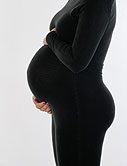
MONDAY, Jan. 10 (HealthDay News) — Women exposed to plasticizers and pesticides at work are more likely to suffer fertility problems and to have lower birth-weight babies, according to a new study.
Researchers analyzed data collected from 6,000 women, average age 30, who were pregnant between 2002 and 2006. More than two-thirds had planned their pregnancy.
Of the 3,719 women who provided information on how long it took them to get pregnant, 15 percent said six months and 10 percent said 12 months. Taking six months or more to become pregnant is considered a long time, said the researchers.
About one in 20 (5.5 percent) of the women had a preterm birth (fewer than 37 weeks of pregnancy) and slightly over 1 percent gave birth before 34 weeks. About 15 percent of babies weighed less than 3,000 grams at birth and 5 percent had a low birth weight (less than 2,500 grams).
The study is published in the Jan. 11 online issue of the journal Occupational and Environmental Medicine.
A number of known risk factors — older age, lower level of education, ethnicity, smoking and drinking — all affected time to conception and birth weight.
But the researchers also found that women with workplace exposure to phthalates (chemicals used to make plastics more flexible) and pesticides were more than twice as likely to take six months or longer to conceive and to have lower birth-weight babies, they said in a journal news release. However, the overall numbers were small, they said.
More information
The U.S. National Institute of Child Health and Human Development has more about fertility and infertility.

